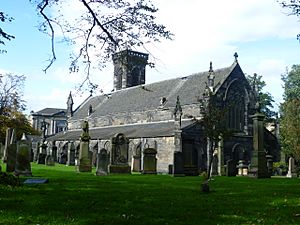John Logan (minister) facts for kids
John Logan (1748–1788) was a Scottish minister who lived in Leith, Scotland. He was known as a popular preacher and also as a historian. Later in his life, he moved to London and focused on writing.
Contents
Early Life and Education
John Logan was born in 1748 on a farm in Soutra, near Fala, Midlothian. His father, George Logan, was a farmer, and his mother was Janet Waterston. His family later moved to Gosford Mains in East Lothian. They were part of a religious group called the Burgher branch of the First Secession, and they attended church in Haddington.
John went to grammar school in Musselburgh. In 1762, he started studying at the University of Edinburgh. There, he was taught by a famous professor named Hugh Blair. A kind nobleman, Lord Elibank, also helped Logan by letting him use his large library.
After finishing his studies to become a minister for the Church of Scotland, Logan became a tutor. He was recommended by Hugh Blair to teach John Sinclair, the son of George Sinclair of Ulbster.
Becoming a Minister
John Logan was officially allowed to preach by the church leaders in Haddington, East Lothian on September 27, 1770. In 1771, he was chosen to be a minister at South Leith Parish Church. There was some discussion about his appointment, partly because Logan had written a play called The Planters of the Vineyard, which was a bit critical. However, in April 1773, he was formally made the "second charge" minister of South Leith parish.
Because of his talent for writing, Logan was chosen in 1775 to join a special committee. This committee was tasked by the General Assembly to update and add to the church's collection of paraphrases (poetic versions of Bible passages) and hymns used in worship. Logan became a very important contributor to this collection.
Challenges and Resignation
Logan's strong interest in plays and the theatre caused some disagreement among his church members. He also faced personal difficulties. Despite these challenges, he had many influential friends who wanted to help him. For example, Adam Smith, a famous economist, wrote letters to help Logan. In 1783, Logan became one of the first members of the Royal Society of Edinburgh, a prestigious group for scientists and thinkers.
In 1783, one of his plays, "Runnamede," was performed at the Theatre Royal in Edinburgh.
By 1785, Logan faced more personal difficulties that made his position as a minister very hard. He decided to resign from his church role on December 27, 1786. He was allowed to receive some money each year from the church after his resignation.
Life in London
After leaving his church position, John Logan moved to London. He spent the rest of his life there, focusing on his writing. He became an editor for a magazine called the English Review, where he worked with another writer named Gilbert Stuart.
In 1787, Logan wrote about the famous Scottish poet Robert Burns, pointing out that Burns was a tenant farmer, not just a simple "ploughman."
In 1788, Logan published a book called A Review of the Principal Charges against Warren Hastings. This book defended Warren Hastings, an important political figure, against accusations made by Edmund Burke. The book caused a legal case for its publisher, John Stockdale, but Stockdale was successfully defended in court.
John Logan passed away in London on December 25, 1788. He was buried on December 28, but the exact location of his grave is not known.
Logan's Writings
John Logan was a historian who followed a certain style of writing history. He also wrote poetry, two plays, and sermons.
History Writings
From 1779 to 1781, Logan gave a series of history lectures in Edinburgh. These lectures were supported by famous scholars like William Robertson and Hugh Blair. In 1781, he published a summary of these lectures called Elements of the Philosophy of History. However, Logan later felt disappointed with Robertson, who supported another person for a history teaching job that Logan had wanted.
In 1787, one of Logan's lectures was published as An Essay on the Manners and Governments of Asia. This work discussed ideas about powerful rulers and religious governments.
Another book, A View of Antient History, published between 1788 and 1793, was believed by Logan's friends to have been written by him. It was actually based on his lectures from Edinburgh.
Poetry
In 1773, Logan published the poems of his friend Michael Bruce. He also included some poems by other writers. In 1781, Logan published his own collection of poems. This included his famous Ode to the Cuckoo and other poems he had previously printed with Michael Bruce's work. His song "The Braes of Yarow" was even republished by the poet Coleridge in his magazine The Watchman.
Drama
Logan's play, Runnamede, was performed in Edinburgh in 1783. The play focused on the importance of people's freedoms. It drew a clear comparison between King John of England and King George III of Great Britain, which was a sensitive topic at the time. Because of this, the play was not allowed to be performed in London by the government's censor. Later, the famous writer Walter Scott mentioned that his idea for the contrast between Saxons and Normans in his novel Ivanhoe came from watching Runnamede.
Sermons
After Logan's death, two volumes of his Sermons were published in 1790 and 1791. His friends, including Hugh Blair, helped supervise their publication.
Images for kids
 | Emma Amos |
 | Edward Mitchell Bannister |
 | Larry D. Alexander |
 | Ernie Barnes |



